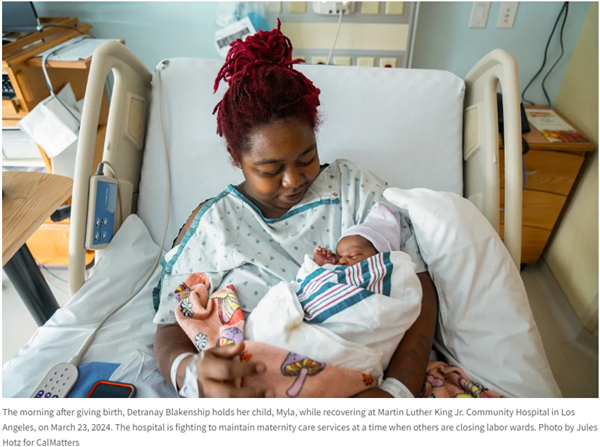Money-making L.A. hospitals quit delivering babies. Inside the fight to keep one labor ward open
by Kristen Hwang, Ana B. Ibarra and Erica Yee
June 6, 2024
 Detranay Blankenship was 16 weeks pregnant when she found out she was expecting. The days passed quickly, and soon she was 7 centimeters dilated at Martin Luther King Jr. Community Hospital.
Detranay Blankenship was 16 weeks pregnant when she found out she was expecting. The days passed quickly, and soon she was 7 centimeters dilated at Martin Luther King Jr. Community Hospital.
The 26-year-old first-time mom wasn’t sure what to expect during labor, but the team at MLK’s maternity ward soon felt like family. Every hour midwife Angela Sojobi bustled in to check on her progress and offer cheerful words of encouragement. When it was time to push, a nurse lowered the lights and flipped on the soothing sound of rain.
After 14 hours of labor, baby Myla made her appearance in the world. “That’s my grandbaby!” Latrina Jackson, Blankenship’s mother, shouted. The family’s cheers rang down the hall.
Blankenship lives just blocks away from MLK, where her labor was cozy and personalized. It was the kind of birth that many parents-to-be hope for, but a decade of widespread cutbacks to maternity care in California has made it almost a luxury. It’s available only because MLK’s leaders are fighting to keep maternity services despite steep financial losses.
Over the last decade, nearly 50 maternity wards have closed across California, with more than half shutting down in just the last four years. Seventeen of them were in Los Angeles County, where maternity ward closures have far outpaced the region’s declining birth rate.
Driving the trend in L.A. are for-profit hospitals owned by multi-state corporations. For-profit companies owned 13 of the 17 hospitals that stopped delivering babies. State data shows more than half closed at a time when the hospital was making millions of dollars for investors. Those who lost the most access were the state’s poorest patients. One hospital that serves predominantly low-income patients was earning 13 times more than the median hospital operating margin in California when it shuttered its labor and delivery ward.
In contrast, government-run and nonprofit hospitals tend to maintain labor and delivery units even if they are losing money overall, according to state data on hospital finances. State law requires nonprofit hospitals such as MLK to address community needs as part of maintaining their tax-exempt status.
Hospitals raking in profits often do so despite losing money on maternity care — the service has long been deemed a money-loser. That’s in part because Medi-Cal, California’s public insurance program which covers half of all births statewide, has had the fifth lowest reimbursement rate for obstetrics in the country, according to the Kaiser Family Foundation. Private insurance pays roughly five times more for an uncomplicated vaginal delivery. Simply put, when for-profit hospitals look at the bottom line and choose to make cuts, one of the first services to disappear is usually maternity care. No law prevents them from doing so.
In the L.A. area, these decisions disproportionately affect low-income Black and Latino communities, a CalMatters analysis found. The closures in L.A. overwhelmingly took place in hospitals where up to 80% of patients had Medi-Cal. These populations have some of the worst pregnancy-related complications and mortality outcomes in the state.
“Marginalized patients, women particularly … have really observed the decline in their care even in a place like California,” said Dr. Laila Al-Marayati, division chief for obstetrics and gynecology at Keck Medicine of USC and Los Angeles General Medical Center.
This is because the state has failed to prioritize women’s health for decades, increasing Medi-Cal obstetrics rates only recently, Al-Marayati said. Hospitals with high numbers of Medi-Cal patients frequently can’t break even on labor and delivery. As a result, maternity care takes a backseat to more lucrative hospital services, leading to the wave of recent closures.
Residents in southern L.A. have been among the hardest hit. In the last few years they’ve lost two maternity wards: Centinela Hospital Medical Center and Memorial Hospital of Gardena Medical Center. Both hospitals are owned by for-profit corporations and happen to serve the highest proportion of Black Californians in the state.
Their closures mean that MLK now operates one of the last maternity wards in…
[READ THE COMPLETE ARTICLE HERE]
